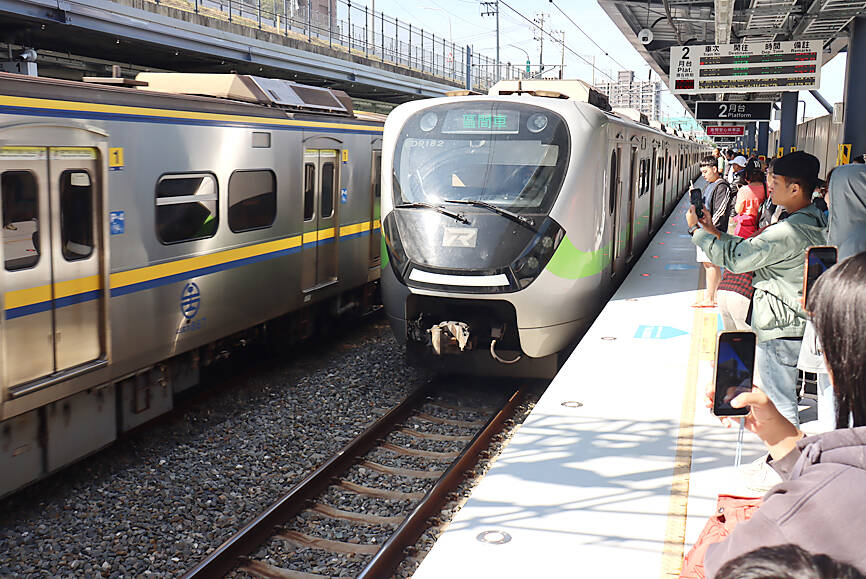Taiwan Railway Corp is likely to post losses of NT$12 billion (US$367.31 million) this year, its first year as a state-owned corporation after having been a government agency for many decades.
The projected losses would exceed the company’s estimation of losses of more than NT$7.4 billion and the losses of NT$11.4 billion the former Taiwan Railways Administration (TRA) posted last year.
The company’s core railway business is likely lose NT$13 billion, up NT$379 million year-on-year, Taiwan Railway data showed.

Photo: Wong Yu-huang, Taipei Times
It would also be saddled with an additional NT$2 billion in expenses that Taiwan Railway chairman Du Wei (杜微) said was needed to convert the former government agency into a commercial company.
The expenses included increasing the employee welfare fund to NT$2.3 billion from NT$1.2 billion as was originally budgeted, spending NT$600 million more than last year on railcar depreciation and paying NT$200 million in fees related to asset transfers, Du said.
The roughly NT$15 billion in losses were expected to be somewhat offset by an expected NT$3.39 billion from side businesses, such as sales of boxed lunches, land development and leasing, he said.
The company generally struggled on the revenue side in its first year, Du said.
Property transfers reduced Taiwan Railway’s rental income, while an ongoing freeze of fares — which have not changed for nearly 30 years — made it hard to increase core revenue, he said.
However, he remained upbeat about the company’s future, saying that operating income might turn positive by as early as 2026, as long as it overcomes the many challenges faced by the TRA, including NT$170 billion in short-term debt.
Taiwan Railway would likely not run a net profit until its new land development projects start generating income, probably no sooner than 2027, Du said.
Although it operated as a company this year, its on-time performance fell to 93.5 percent, well short of its 97 percent target and down from 95.98 percent last year and 94.98 percent in 2022.
Du attributed the drop in performance to damage to the rail network caused by natural catastrophes, with earthquakes and aftershocks resulting in more than 900 delays of Taiwan Railway trains.
Heavy rain and typhoons also contributed to the on-time woes, he said.
Du said the firm has a target for 99 percent of its services to be on time by 2033.
The two-decade plan to corporatize the TRA, which was founded in 1948, did not gain traction until 2018 and 2021, when two fatal derailments occurred, highlighting the need for an across-the-board overhaul of the agency to ensure safer and more efficient rail travel.
Taiwan Railway has established a unit dedicated to rail safety and devised a five-year safety-enhancement plan to improve risk assessments and implement performance evaluations, Du said.
It is also reinforcing its own safety management system to bolster the control and prevention of risk hazards, especially in light of crashes that resulted from poor driving and dispatching, Du said.
Following those incidents, personnel underwent intensive training on cars newly equipped with automatic train protection devices at training centers across Taiwan, he added.

Taiwan is stepping up plans to create self-sufficient supply chains for combat drones and increase foreign orders from the US to counter China’s numerical superiority, a defense official said on Saturday. Commenting on condition of anonymity, the official said the nation’s armed forces are in agreement with US Admiral Samuel Paparo’s assessment that Taiwan’s military must be prepared to turn the nation’s waters into a “hellscape” for the Chinese People’s Liberation Army (PLA). Paparo, the commander of the US Indo-Pacific Command, reiterated the concept during a Congressional hearing in Washington on Wednesday. He first coined the term in a security conference last

Prosecutors today declined to say who was questioned regarding alleged forgery on petitions to recall Democratic Progressive Party (DPP) legislators, after Chinese-language media earlier reported that members of the Chinese Nationalist Party (KMT) Youth League were brought in for questioning. The Ministry of Justice Investigation Bureau confirmed that two people had been questioned, but did not disclose any further information about the ongoing investigation. KMT Youth League members Lee Hsiao-liang (李孝亮) and Liu Szu-yin (劉思吟) — who are leading the effort to recall DPP caucus chief executive Rosalia Wu (吳思瑤) and Legislator Wu Pei-yi (吳沛憶) — both posted on Facebook saying: “I

Sung Chien-liang (宋建樑), who led efforts to recall Democratic Progressive Party (DPP) Legislator Lee Kun-cheng (李坤城), was released on bail of NT$80,000 today amid outcry over his decision to wear a Nazi armband to questioning the night before. Sung arrived at the New Taipei District Prosecutors’ Office for questioning in a recall petition forgery case last night wearing a red armband bearing a swastika, carrying a copy of Adolf Hitler’s Mein Kampf and giving a Nazi salute. Sung left the building at 1:15am without the armband and covering the book with his coat. Lee said today that this is a serious

The Ministry of Economic Affairs has fined Taobao NT$1.2 million (US$36,912) for advertisements that exceed its approved business scope, requiring the Chinese e-commerce platform to make corrections in the first half of this year or its license may be revoked. Lawmakers have called for stricter enforcement of Chinese e-commerce platforms and measures to prevent China from laundering its goods through Taiwan in response to US President Donald Trump’s heavy tariffs on China. The Legislative Yuan’s Finance Committee met today to discuss policies to prevent China from dumping goods in Taiwan, inviting government agencies to report. Democratic Progressive Party Legislator Kuo Kuo-wen (郭國文) said